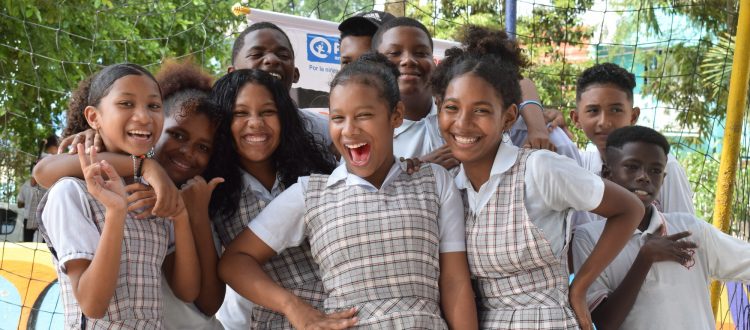(In-depth Interview) Bridging Gaps, Building Futures: Our Efforts and Challenges in Advancing Education, Child Protection and Girls’ Rights in Colombia
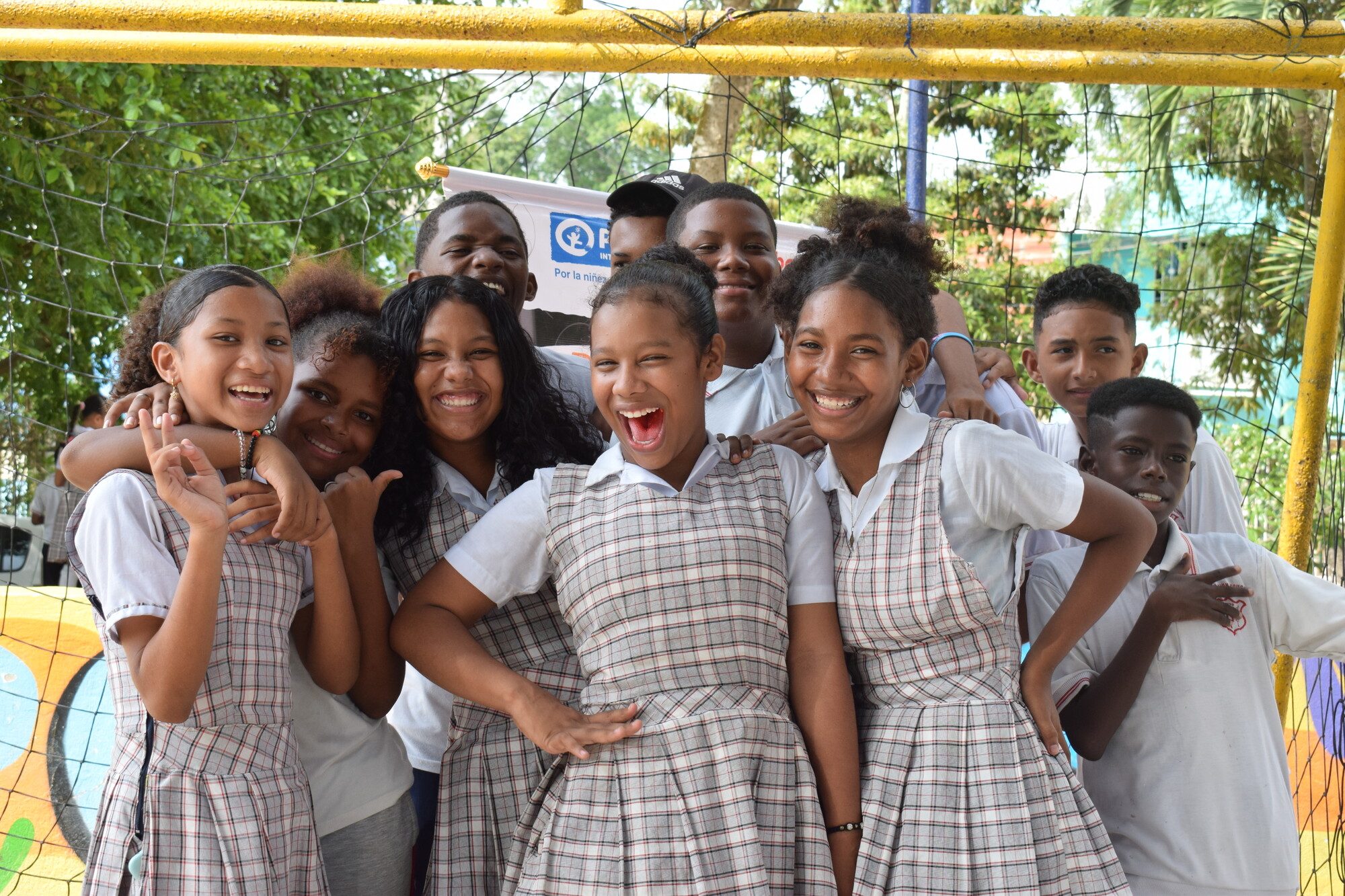 Plan International has been working in Colombia for over 60 years.
Plan International has been working in Colombia for over 60 years.
What first comes to your mind when you think of Colombia, a country situated in the north-western part of South America and far from Hong Kong? Is it coffee beans, Colombian roses, or the frequent, rampant violence and drug trafficking reported in the news?
Plan International has been working in this multi-ethnic country for over 60 years and has assisted 13.5 million people in the last five years. Angela Anzola, the native-born CEO of Plan International (Colombia), recently made her first visit to Hong Kong and shared insights of our work on the ground.
“Colombia is not the country that people typically think of when considering support even though the needs of children, especially girls, here are very urgent. I am truly grateful to every Hong Kong donor who has reached out to help,” Angela expressed her gratitude towards our donors in her interview.
One of the missions for Angela’s visit to Hong Kong was to implement a new two-year project supported by Hong Kong. This initiative, in collaboration with the Internet Society Foundation in Colombia, aims to empower 25 young women’s start-ups by enhancing their skills in using the internet and technology, and thus achieving economic empowerment and self-sufficiency.
“This is crucial for young women living in conflict-afflicted areas. Many women in these areas don’t have jobs, don’t have income, and have very little opportunity to learn technology skills that could improve their livelihoods,” Angela added.
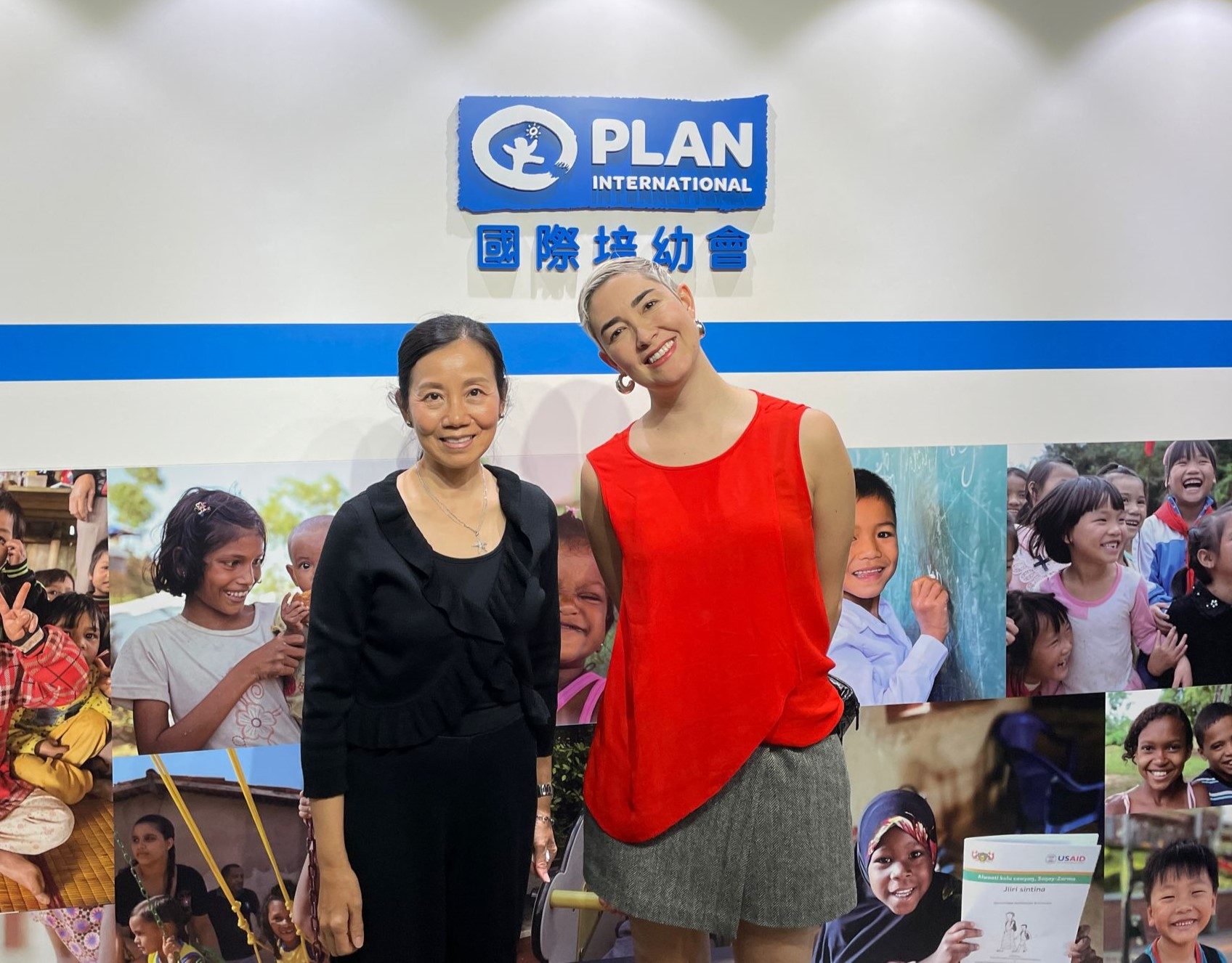 Dr. Kanie Siu, CEO of Plan International Hong Kong (left) welcomes Angela Anzola (right), CEO of Plan International (Colombia) to Hong Kong.
Dr. Kanie Siu, CEO of Plan International Hong Kong (left) welcomes Angela Anzola (right), CEO of Plan International (Colombia) to Hong Kong.
Colombia is the fourth largest country in Latin America, roughly triple the size of Japan. The Amazon rainforest covers 41% of its territory, contributing to its immense biodiversity. And, one in every ten species on earth can be found in Colombia. However, with nearly 40% of Colombia’s population in poverty, only just above 40% of the rural population has access to safe drinking water, and food security is a serious concern. Amidst these challenges, Colombia is also facing serious security problems. People are dealing with illegal armed groups, forced displacements, recruitment of girls, boys and adolescents, and social unrest.
Angela points out that landmines and kidnappings are particularly worrying on the ground. All field staff must conduct security assessments by a team of security experts before visiting any community. We must undertake thorough evaluations and communicate with the community to safeguard both our colleagues and the communities.
She appreciates the understanding and patience of our donors in Hong Kong, noting that the collection of sponsored children’s letters and updates has been temporarily suspended earlier in 2024 in some communities to prevent putting children and communities at risk. This is to protect children’s personal information and letters from being misused for illegal purposes.
Colombia is one of the most heavily mined countries in the world. “Many children in Colombia are suffering because of this. Some (armed groups) even put animal faeces in the mines to increase the likelihood of infection among those injured. As a result, many young people have lost their legs,” Angela concludes, “These are all reasons why we need to continue our efforts to foster reconciliation and peacebuilding and strive for less violence.”
Ensuring the safety of children is our utmost priority in Colombia. How can we achieve this? Angela’s answer is simple, “keep children in school is the first thing,” but in practice, this is not that easy.
To prevent children from being recruited by armed groups or criminal gangs, Plan International offers workshops for children and their parents, emphasising the importance of education and remaining in school. Also, the implementation of inclusive quality education projects is crucial to support the processes of access and permanence in education. These projects include the strengthening of schools, teachers training, school levelling and the delivery of school kits and uniforms and the setup of child-friendly spaces.
“Schools are protective spaces. We can protect children from violence by keeping them at the schools,” explains Angela. “However, local families are very poor and have too many mouths to feed. Even though their children could be in danger, some parents believe that their children might be better off joining these illegal groups. As such, some children head into mountainous areas, leaving them even harder to reach and at greater risk.”
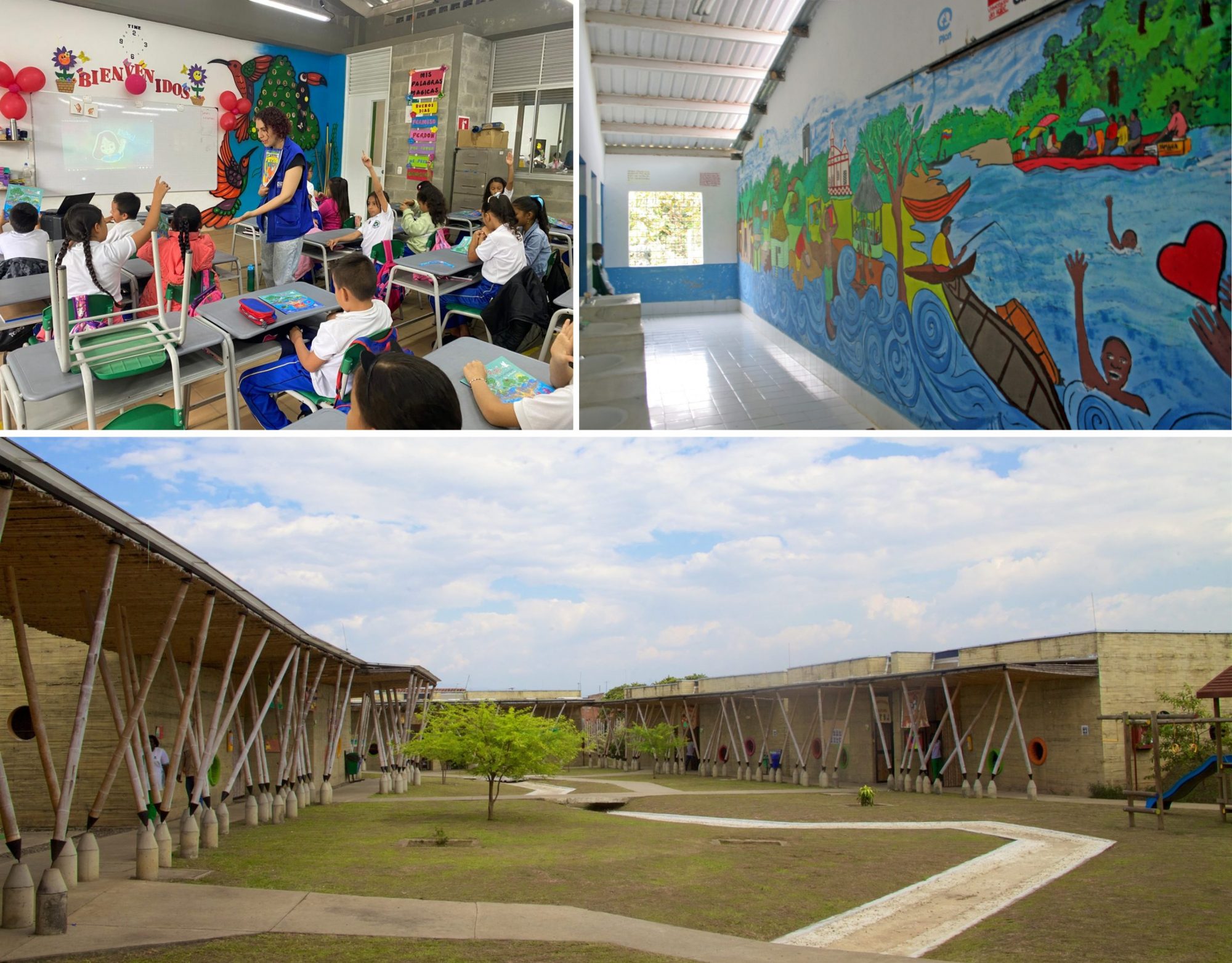 Plan International supported schools and early child learning centres, providing a safe and quality educational environment for children.
Plan International supported schools and early child learning centres, providing a safe and quality educational environment for children.
Despite the armed conflict and lack of road access in rural areas, Plan International is supporting local communities with infrastructure for education and water, sanitation and hygiene (WASH). This includes building not only classrooms, lunchrooms, safe circulation spaces, and toilets in schools, but also drinking water systems, water filters, and household sanitation toilets. We also support local families with agricultural and life skills and the strengthening of rural entrepreneurship so that they can grow different crops like avocados, coffee, and bananas to improve food security and economic stability.
 Cash assistance enables families to buy food (left) while water filtration kits (right) are distributed in Colombia.
Cash assistance enables families to buy food (left) while water filtration kits (right) are distributed in Colombia.
The capital, Bogotá, is relatively safe, but the armed conflict has also led to the forced displacement of 8.7 million people from rural areas across the country to the city, along with 2.9 million migrants and refugees from neighbouring Venezuela – with an expected increase of another one to two million people in the future – creating new problems due to overcrowding and the lack of national and local government capacity to provide care and aid.
“Imagine a group of displaced persons and refugees larger than the population of Hong Kong, pouring into a city already stretched for resources. They may lack the education or skills needed for the labour market in the city, making it difficult for them to find jobs or secure proper shelters. They used to feel productive and proud of what they did in the rural areas but now they struggle with low self-esteem and frustration. Unfortunately, this can lead to deterioration in local security, and tragically, may contribute to an increase in domestic violence against children.”
It is reported that more than half of the victims of domestic violence in the country are girls. Considering this, Plan International provides “safe spaces” to address the needs of both Colombian Internally Displaced People (IDP) and Venezuelan migrants and refugees.
 Children and adolescents participated in playful awareness-raising workshops the “Child Friendly Spaces” – one of the projects funded by Hong Kong for the protection of migrants and refugees in Colombia.
Children and adolescents participated in playful awareness-raising workshops the “Child Friendly Spaces” – one of the projects funded by Hong Kong for the protection of migrants and refugees in Colombia.
Furthermore, curbing gender-based violence is our utmost priority, as child marriage, femicide, and sexual violence, are severe in Colombia. Yet, the existing laws are insufficient to protect the rights of women, particularly girls.
For example, existing laws allow girls as young as 14 years old to get married with the permission of their parents or legal representatives, leading many families to ‘sell’ their young daughters to adult men. Plan International has been advocating for the local legislation of Bill 155 to eliminate this harmful practice, recognising that child and forced marriages are violations of the fundamental rights of children, successfully raising media and public awareness about the issue. In mid-November, we finally witnessed the long-awaited good news: the Colombian Senate approved the landmark bill, raising the minimum age for marriage from 14 to 18, which is a key step forward in the protection of the rights of children and adolescents.
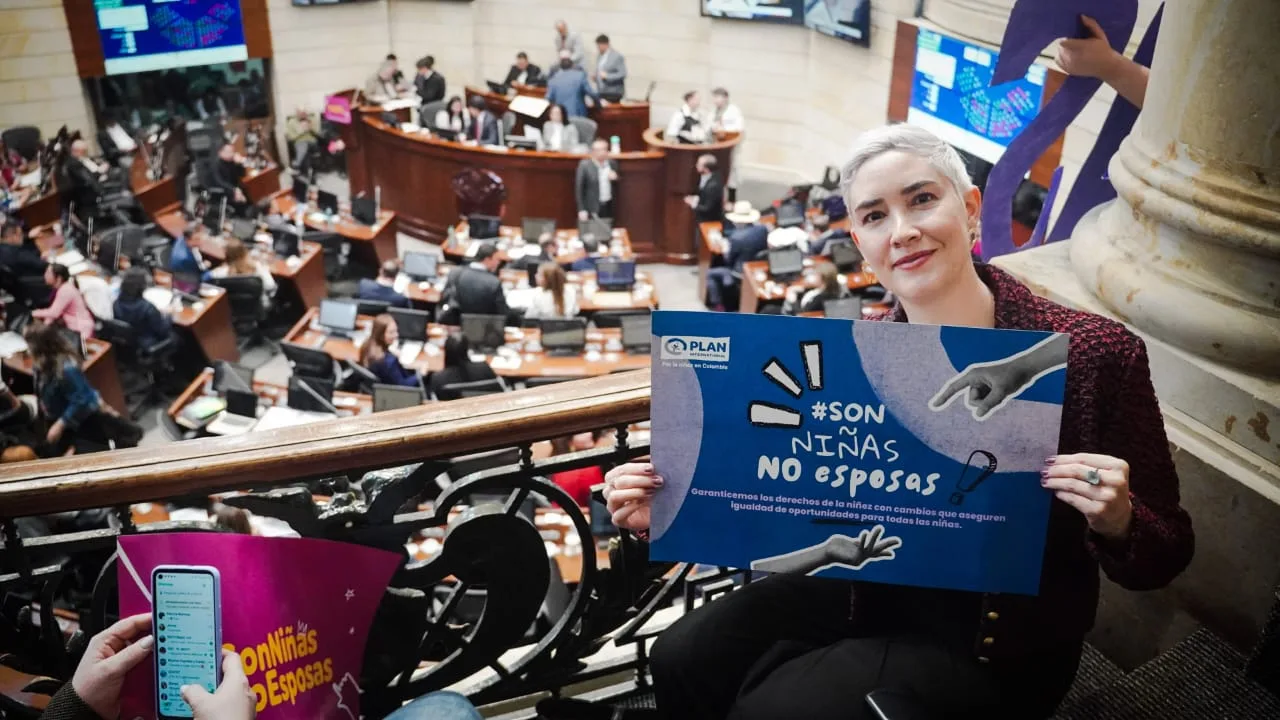 The approval of the bill to raise the minimum age for marriage to 18 years old, is an important first step toward positive change.
The approval of the bill to raise the minimum age for marriage to 18 years old, is an important first step toward positive change.
Despite this great progress, there is still much to be done. Our awareness-raising and educational efforts continue unabated, ensuring that people recognise the importance of girls and adolescent girls being able to make their own life decisions.
“We have so many families here who insist that their daughters should start dating at a very young age, with the hope of marrying them off early. We need to address this issue significantly. It is crucial to provide girls not only with education, but also with extracurricular activities that promote their growth, development, and ability to form their ideas about their lives and future,” Angela explains, “We must also ensure that parents wait until their daughters turn 18, before making decisions about their marriage, and respecting their daughters’ wishes.”
Angela, who once lived in Beijing, has a Chinese name she cherishes, “Anxin 安心”, which means “peace of mind”. Before concluding the interview, she recorded a 20-second video to personally thank the donors from Hong Kong:
Special Q&A Session – Here is Angela’s response to questions collected from sponsors with sponsored children in Colombia:
Question 1: Do Colombians know about Hong Kong? How should I introduce Hong Kong to my sponsored child?
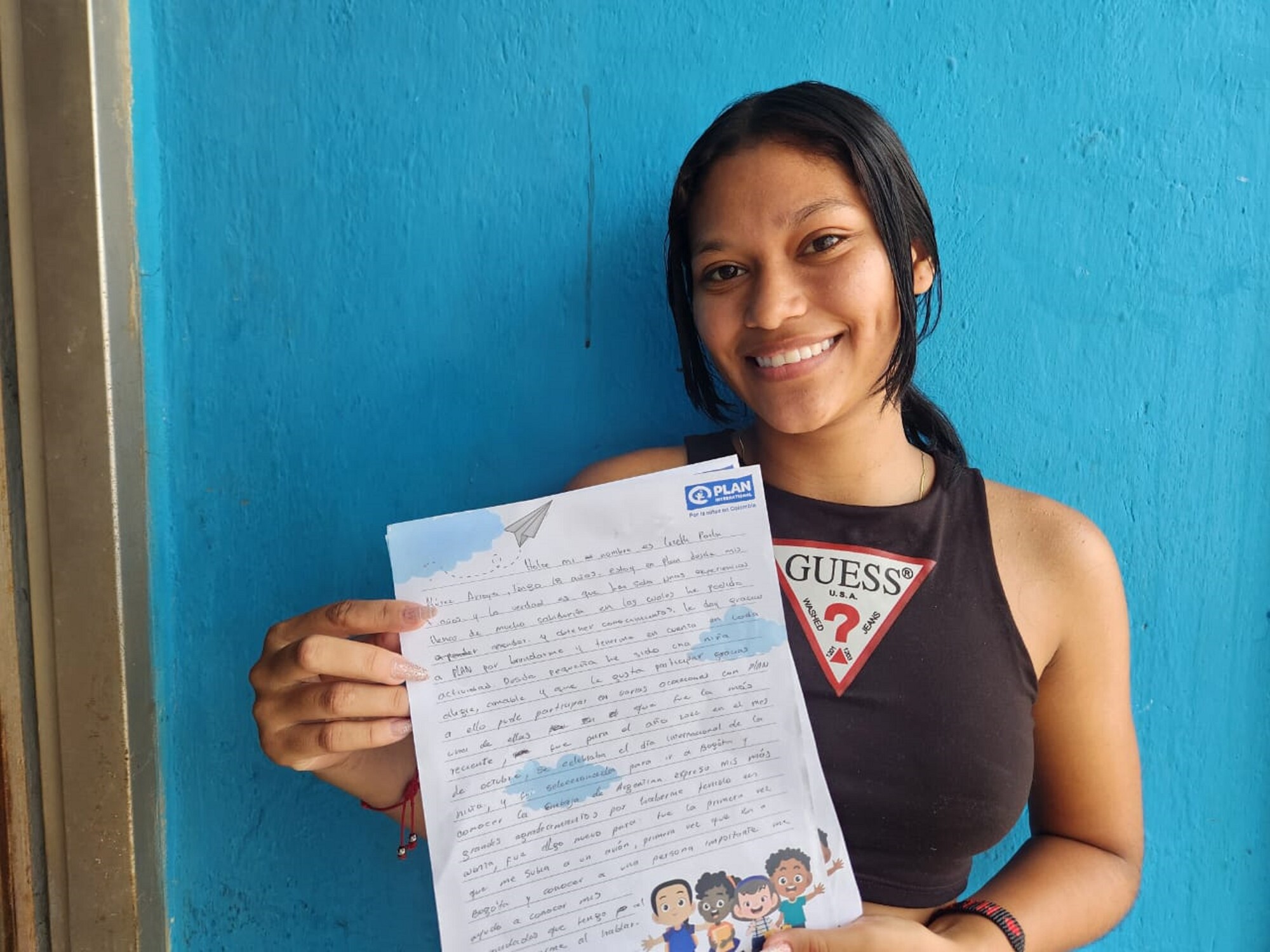 “I think Hong Kong is quite famous for some people here because some products made in Hong Kong long time ago can still be found. Most people, especially those from rural areas, may not know about Asia, let alone Hong Kong. So, when introducing Hong Kong to your sponsored child, you may need to give a lot of contexts. However, I would like to highlight that our children would be delighted just to receive letters from their sponsors.” “I think Hong Kong is quite famous for some people here because some products made in Hong Kong long time ago can still be found. Most people, especially those from rural areas, may not know about Asia, let alone Hong Kong. So, when introducing Hong Kong to your sponsored child, you may need to give a lot of contexts. However, I would like to highlight that our children would be delighted just to receive letters from their sponsors.” |
Question 2: My sponsored child said he was so happy to receive a learning material kit from Plan International. What’s in it? How is this important for their learning?
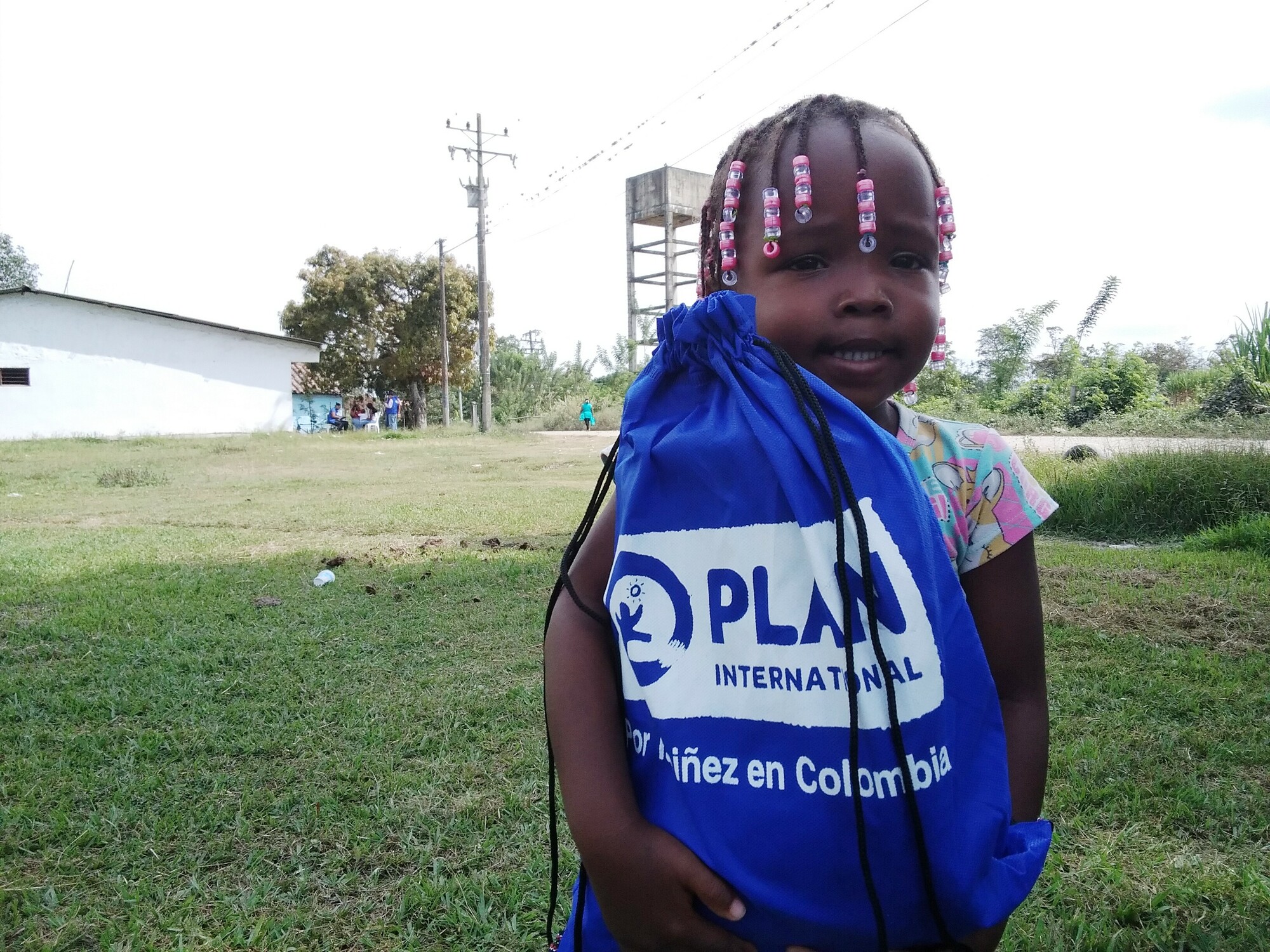 “Sponsored children, especially those from rural areas, often come from very poor families with very limited resources and may not afford school supplies. A learning material kit can encourage children to continue to go to school. The kit usually contains essential stationery items like notebooks, pencils, coloured pens, and sometimes glue and sticky notes. While it’s very basic, nothing fancy, it makes a significant difference. Keeping children in school not only allows them access to education but also prevents them from having to work instead.” “Sponsored children, especially those from rural areas, often come from very poor families with very limited resources and may not afford school supplies. A learning material kit can encourage children to continue to go to school. The kit usually contains essential stationery items like notebooks, pencils, coloured pens, and sometimes glue and sticky notes. While it’s very basic, nothing fancy, it makes a significant difference. Keeping children in school not only allows them access to education but also prevents them from having to work instead.” |
